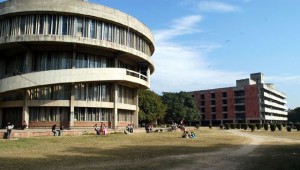PU, two other institutes to study caste-based conflict in Haryana
 Haryana: The Haryana government has requested Chandigarh-based Panjab University, the Centre for Research in Rural Development (CRRID) and Kurukshetra University to conduct sample surveys on the issue of caste-based conflicts in the state. The three institutions have been asked to send their recommendations to the state government.
Haryana: The Haryana government has requested Chandigarh-based Panjab University, the Centre for Research in Rural Development (CRRID) and Kurukshetra University to conduct sample surveys on the issue of caste-based conflicts in the state. The three institutions have been asked to send their recommendations to the state government.
This move comes in the wake of recommendations made by Justice (retd) Iqbal Singh Commission of Inquiry (CoI) in its report on Mirchpur violence in April 2010, tabled in the state assembly on September 4.
An elderly dalit Tara Chand and his teenaged handicapped daughter Suman were killed as their house was set ablaze in caste-related violence.
Several persons were also injured in the violent clashes between Balmikis and Jats communities.
The episode originated as a result of a petty altercation in village on April 19, 2010, when some upper caste youth passing through a Balimiki basti threw stones at a barking dog. This incident took an ugly turn on April 21 morning, when the two communities indulged in violent clashes with each other.
In its recommendations, the report said while research was essential for guiding policy-making and having action plans to effectively deal with such problem, there has been very little research on the issue of caste-based conflict in Haryana.
The report added that sample surveys should be held at regular intervals and data made available for analysis.
“Besides, the police and the court records should contain information on victims and the relationship of victims and offenders. A better understanding of victimisation — including the dynamics of the victim-offender relationship — and polarisation of the community will help in support services and providing justice,’’ the commission said.
Recognise social boycotts as atrocity
The report said that officials should recognise social boycotts as a grave form of economic and social violence and a violation of livelihood rights, and was therefore, an atrocity under the SC &ST (Prevention of Atrocities) Act.
The district collector should visit the village promptly and provide compensation, relief and a comprehensive rehabilitation packages. as provided under the SC and the ST Act.
The state government in its ATR said that all the deputy commissioners have been directed to recognise social boycotts as an atrocity under the SC and ST Act.
Doctors not trained in preparing MLRs
The inquiry report said that medical evidence recorded by the commission showed doctors were not well-trained with regards to medical examinations. “They have not shown the seat of injuries in the diagrams in the medico legal report (MLR) which is a major default on their part. There is a need to make them aware of this important aspect of medico-legal examination,’’ the report said.
It also said that it was necessary to videograph the post mortem examination in cases of SC &ST Act.
With this collaborative medical evidence the case can be strengthened and it should be ensured that it is effectively produced. The licence of medical practitioner should be taken away in case of medical negligence, malpractice and destruction of evidence in the case of atrocities against dalit women, it recommendedx.
The state government in its ATR said that a manual had been prepared on post-mortem and medico-legal examination and all concerned have been instructed to prepare MLRs in a computerised formats.
Teachers asked to spot any caste unease
The state government also said that all educational institutions have been asked to be display notices regarding zero-tolerance on the issue of caste based division and discourage practice of disparity based on caste. Besides, teachers would be instructed to communicate with students during lectures to find out any anticipated situation where students from scheduled castes would feel caste based uneasiness.
‘No atrocity-prone areas in state’
Responding to the Commission of Inquiry’s (CoI’s) recommendations, the state government in its action-taken report tabled in the state assembly said while the district magistrates had been directed to analyse the records of the cases registered under the Scheduled Castes and Scheduled Tribes (Prevention of Atrocities) Act for the last five years and identify atrocity prone areas in the state but as per the information available no area in the state can be termed as atrocity prone area.
The CoI had recommended that in view of the increase in crime against dalits the state government was required to declare atrocity prone areas after conducting a survey.
Source: Hindustan Times





